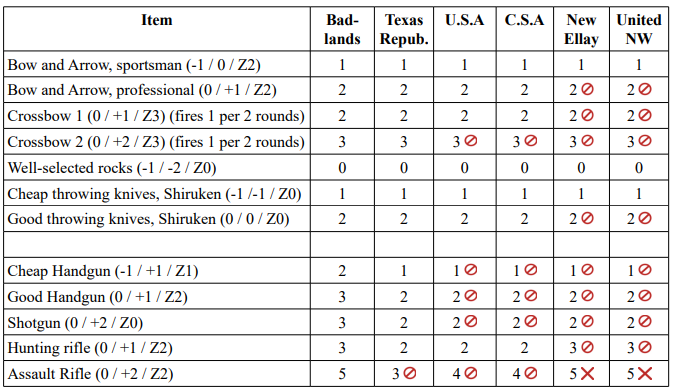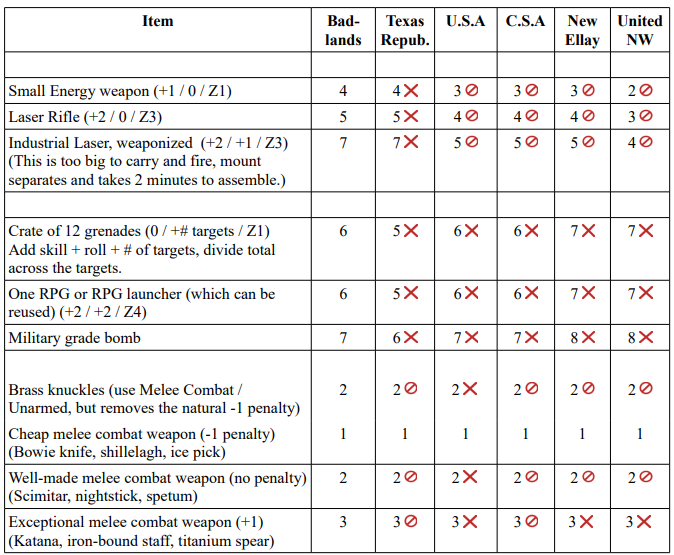In the After the Collapse world, there is not a consistent concept of money, and some things are more easily available in some places than in others. For instance, a tankful of diesel fuel is nearly impossible to get in the Badlands. However, in the Republic of Texas, the same fuel could be bought for a hotel maid's weekly salary, or for a day's salary of a low-level bank employee. Rather than try to document currencies and exchange rates, the game system simply identifies the Resources level that a given item represents. The characters have a Resources skill and that should be compared directly to the values below.
The following table shows the equivalent Resources for an item, in each of the game regions. A character can generally obtain one item that equals his Resources level per adventure, and 3 or 4 items of one level below. Beware of players abusing this and collecting exceptional items – each character generally should never have more than one item over his Resource skill, or more than two items at his Resource skill. All purchases are subject to GM approval, of course, and sometimes must be role-played to obtain. Note that this is especially true of items that can only be obtained on the black market because they are restricted or forbidden. Any item that requires Epic (+7) Resources or greater will require role-playing to obtain and doing so might involve significant obstacles to overcome.
The table below does not include boring items, like food, standard clothing, etc. If you're tracking that sort of item, you have not yet bought into the less restrictive, pulp-fiction style gaming of the FATE system – think about grand heroics, not mundane bookkeeping. If a character has a skill at Fair (+2) or better, just assume he has the normal tools for that skill (lock picks, socket wrench set and a multi-tool, volt meter, bandages, etc.) and that they are with him if they are easily carryable. However, if the normal tools wouldn't fit in a pocket or two, the player must make a note of where the items are and how they are being transported. The player doesn't have to specify if he isn't going to try to claim the items are anywhere other than where they normally are, such as 'back at the lab' or 'in the garage storehouse.' If he wants to claim that he has a spare set of brake pads and shoes with him that he needs a note on his sheet. (And he could typically spend a FATE point to write the note retroactively. As a GM, your guiding principle should be what makes a good story, and you can cover up a lot of sins by telling the player to spend a FATE point on something.)
| - | The item is essentially unavailable |
| # ! # | Entries with two values separated by a bar represent gasoline/diesel and electric versions of that item. |
 | Item is restricted. Being caught with it (without a proper license) is a fine and it will be confiscated. |
 | Item is forbidden. Being caught with it will probably lead to jail time or worse. |
While nothing is marked as forbidden in the Badlands, the local warlord's word is law, and he likely is looking for a reason to have strangers killed. And he doesn't need a good reason.
Weapons
Weapons will all have two numbers after them. These are attack and damage modifiers. Ranged weapons also will have a range given in Zones. The energy weapons generally have a higher attack modifier than a damage modifier; the firearms are the opposite. It is easier to aim an energy weapon, but they do less damage.
Attack Modifier
The attack modifier is added to the requisite skill, either the appropriate Ranged Combat or Melee Combat skill, ONLY for the purpose of seeing if the attack is successful, but is NOT used in determining if how many shifts if applies. This means that it is very possible to make an attack that does no damage. When this happens, the result of the attack can be a situational advantage on the character the following round.
Damage Modifier
The Damage Modifier is the opposite of the attack modifier. It is NOT applied to the attack skill for the purpose of determining whether or not the attack hit, but, if there is a hit, the damage modifier is applied to the shifts of result.
Doing Zero Damage
A positive attack modifier or a negative damage modifier can cause a situation where an attack hits but does no damage. These hits will have a distracting effect, perhaps causing a situational advantage in the next round, and might have a secondary effect if they hit (such as a poison dart), but they do not directly cause any marks in the victim's stress track.
This message was last edited by the GM at 13:29, Sat 29 July 2023.











